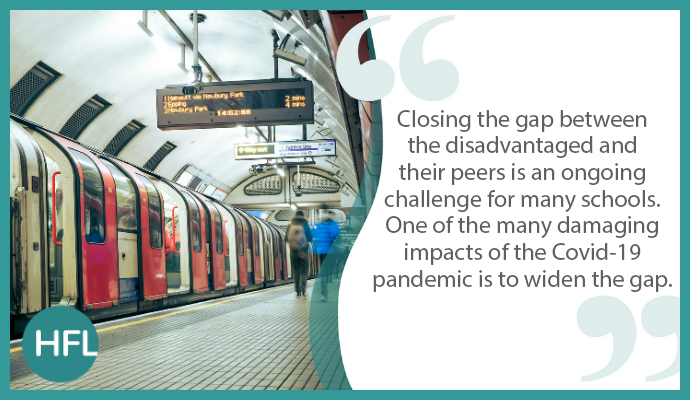
Minding the gap whether on the underground or in education there are many parallels; we are constantly reminded of its presence, we can see it’s there whenever we look despite efforts to reduce it, in some cases we might even be relieved it hasn’t got wider since the pandemic, but the fact of the matter is the gap stubbornly remains and we have a duty to eliminate it.
Disadvantaged pupils are defined by Ofsted as those eligible for free school meals at any point in the past six years which includes groups such as Pupil Premium pupils, pupils with an Educational Health Care Plan, pupils known to a social worker and other groups with protected characteristics and/or covered by the Equalities Act 2010. We know that often students face a multitude of barriers to learning and that new barriers emerge in line with societal change that schools must rapidly identify and work with pupils to overcome if we are to make progress in this agenda. Whilst adapting to societal change has always been something that schools must do, we have seen an unprecedented level of societal change post pandemic, from significant rises in the number of students with SEND to a mental health epidemic among young people to collapsing public services. It is more important than ever that we keep a laser like focus on ensuring that schools are effectively identifying and overcoming barriers that learners are facing in schools which may serve to further disadvantage them.
This blog provides a whistle stop tour of some, but not all of the areas that span beyond those traditionally associated with regular monitoring of provision and understanding of data for disadvantaged pupils. We as Governors need to be confident that our settings are developing their plans to approach, review and respond to societal changes that have an impact on students, from wellbeing to behaviour. Where are the changes happening that can lead to additional barriers for the disadvantaged and are we effectively tackling them?
SEND is a huge issue nationally. We know that post-pandemic the level of SEND has risen with some groups of SEND learners particularly adversely impacted by the pandemic. Attendance is a concern across the board, but students with SEND face more barriers to attendance than their peers. Language is key across the board when it comes to closing the gap, and this is particularly true of attendance and SEND. Does your Board talk about ‘non-attendance’ as opposed to ‘school refusal’ in relation to SEND? The inference of refusal is that it’s a choice a child is making rather than there being an accessibility issue relating to a child’s needs that needs to be overcome. This is just one example of the importance of the lexicon of language in Governance.
Legal duties in relation to SEND are set out laid in the Governance Handbook and both the Children and families Act 2014 and the SEND Code of Practice and SEND regulations 2014. All boards should have a SEND link governor who will have oversight of their school’s work in fulfilling their obligations to ensure that pupils with SEND have their needs met and the board must report annually on their SEND provision by publishing relevant information on the school website and ensure it’s clearly signposted to parents. What actions do you as a Board take in relation to the report and how is progressed monitored? Attending external scrutiny visits regarding your schools disadvantaged pupils will provide valuable, triangulated evidence of how your school is making progress in closing the gap.
SEND and Alternative Provision Plan
Last month saw the publication of the government’s long awaited Improvement Plan for Special Educational Needs and Disabilities and Alternative Provision with their vision to provide “right support, right place, right time”. The plan includes setting new national SEND and AP standards to give families confidence in the support available to them; making the Education Health and Care Plan (EHCP) process easier for the children and young people who need one through a standardised approach and better use of technology; investing in more special schools for more timely access to support within the local area; strengthening accountability so responsibilities are known and families can see how well their local area is performing; improving communication with parents so concerns are dealt with quickly through new guidance for LA SEND caseworkers; investing in the workforce to increase access to specialists and introducing a new SENDCo national qualification. This short You Tube video talks about the DfE’s improvement plan in more detail. Naturally, the devil will be in the detail and we await seeing how impactful new policies are at a national level will be. Boards can look at some of the key concepts in the paper such as early intervention and ask questions about the effectiveness of their setting in providing that early support such that needs don’t go unmet for an extended period leading to significant gaps in learning.
Relationships, sex and health education (RSHE) curriculum
The DfE are reviewing statutory guidance on this area of the curriculum following concerns that inappropriate material is being taught in schools. The DfE is seeking through its review to introduce safeguards to stop pupils being taught contested and potentially damaging concepts, and to consider introducing age ratings for curriculum content. Has your board discussed this, noted that this review is underway and how the school is planning to respond to the updated guidance? There will likely be pupil and parental challenge once the guidance is made public. Review of relationships, sex and health education to protect children to conclude by end of year - GOV.UK (www.gov.uk)
Pupil voice
Listening to the lived experiences of disadvantaged pupil and understanding the barriers that they identify prior to developing strategies for overcoming is key to closing the disadvantage gap. Many schools are using the tools on the Votes for Schools website to empower pupil voice, helping pupils to shape the lived experience and learning in their schools. Governors will use surveys and visits to sample and hear pupil voice, however we should not view these as the only approaches. Perhaps you can suggest your school looks at the resources here to enable you collectively as leaders to view and sample pupil voice through a different lens? VotesforSchools - Personal Development, SMSC & PSHE
Vaping
As we are all aware smoking by pupils in and outside schools is a problem that’s as old as the hills with pupils sanctioned and often missing learning as a result. Governors will be aware of the glamourisation of vaping by social media influencers and the epidemic of cheap, disposable and hard to detect vapes finding their way into schools. The challenges of vaping span beyond attendance challenges posed by suspensions and exclusions to very real health concerns with lead, nickel and chromium having been found in illegal vapes used by school children. The RHSE review will incorporate vaping, but in the meantime are Governors satisfied that their setting has an effective policy on vaping and that appropriate education approaches to deter students from vaping are in place? UK health expert raises alarm at vaping ‘epidemic’ among teenagers | E-cigarettes | The Guardian
Social media
Financial Times Films has published an incredibly powerful short film capturing the concerns raised most recently by the Childrens Commissioner, Rachel de Souza. This may be worth viewing as a board, not because we have any ability to close this particular stable door or believe that the proposed Online Safety bill will be the silver bullet to put the genie back in the social media bottle, but more so that we are aware of the enormous challenge that young people face navigating their way in the ‘online’ world safely and without harm. The impact on wellbeing of children should not be underestimated and provides additional barriers to learning. Capture, who's looking after the children? | FT Film Standpoint - YouTube
Transgender policy guidance
Whilst not directly related to the disadvantage gap, we know that some transgender young people face barriers to learning. This debate remains sensitive and politicised. The DfE has promised updated guidance for schools by the end of the summer term. As a board have you considered what you have in place and how you will respond to updated guidance that may challenge your current approach? www.bbc.co.uk/news/uk-65127170
The disadvantage gap is a huge subject that we can only scratch the surface of in a blog but hopefully the point made is there is a wide spectrum of influences on those disadvantaged pupils, exacerbated by changes in society. Within schools we can do our very best to improve life for disadvantaged pupils through robust policy, relevant curriculum intent and impact, modelling safe behaviour, providing structure and reward, specialist help and teaching and a lived experience that prepares them for the wider world. In our work as governors, we need to be aware of the gap between disadvantaged pupils and their peers, strategically monitor the gap, ensure the impact of all plans and initiatives (and the necessary budgeted expenditure) closes the gap and in time all this comes together to close the gap for good.
The HFL Governance team stand ready to support you whether it be through our acclaimed training programme, our supportive Clerking and Chairs service or our fantastic helpdesk.
To contact us please use the following:
Governance Helpdesk – 01438 544487
Governance Training – 01438 544478
Governance Clerking - 01438 544487
Or email us at governance@hfleducation.org



